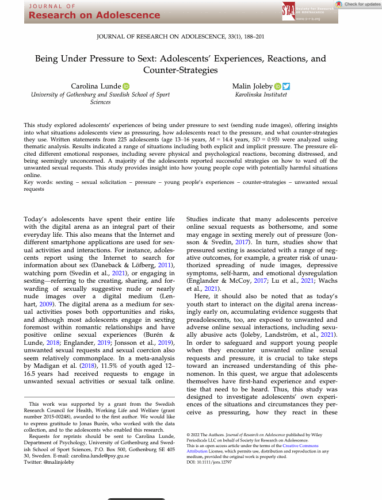Sexting
Being Under Pressure to Sext: Adolescents’ Experiences, Reactions, and Counter-Strategies.
Open Access: Yes.
Abstract
This study explored adolescents’ experiences of being under pressure to sext (sending nude images), offering insights into what situations adolescents view as pressuring, how adolescents react to the pressure, and what counter-strategies they use. Written statements from 225 adolescents (age 13-16 years, M = 14.4 years, SD = 0.93) were analyzed using thematic analysis. Results indicated a range of situations including both explicit and implicit pressure. The pressure elicited different emotional responses, including severe physical and psychological reactions, becoming distressed, and being seemingly unconcerned. A majority of the adolescents reported successful strategies on how to ward off the unwanted sexual requests. This study provides insight into how young people cope with potentially harmful situations online.
Relevance
“It was most common that the adolescent described one specific event of receiving pressure to sext, indicating that it had been a one-time experience. A large group had, however, received pressure to engage in sexting on multiple occasions.” The average age of being pressured to send a sext was 13 years old.
Most commonly, adolescents were “unexpectedly…asked to send nude pictures, by either an unknown person or someone that the adolescent knew.” But they also were pressured after receiving unrequested nude photos from others, or “situations with more explicit forms of pressure” such as nagging and aggressive threats – some when they were 11 years old.
Although some of the adolescents were “seemingly unconcerned,” many others were distressed and even experienced “severe physical and psychological reaction.”
Adolescent strategies for responding included blocking the requester from. social media, “saying no, and explaining that one did not want to take part in what the person asked for” (but “resisting or bluntly saying no was not an obvious way out for everyone”), and faking excuses for not being able to do so. It was clear that many adolescents recognized that standing up for themselves was a skill they needed to develop.
The authors write that “discussions and educational efforts about sexual consent in relationships should stress that the same principles apply to the online sphere…such efforts also need to stress the impact of social dynamics, masculine norms, and gendered power relations.”
“It is noteworthy that almost none of the participants in this study described help- or support-seeking strategies, such as turning to a trusted adult or a peer, despite the large number of situations described as adverse or emotionally stressful.” Hence, “we argue that it is crucial to prepare young people for potential online threats and provide them with knowledge, confidence, and strategies to handle them.”
Citation
Lunde, C., & Joleby, M. (2023). Being Under Pressure to Sext: Adolescents’ Experiences, Reactions, and Counter-Strategies. Journal of research on adolescence, 33(1), 188–201. https://doi.org/10.1111/jora.12797

